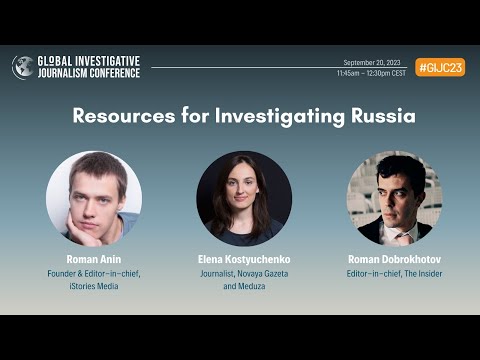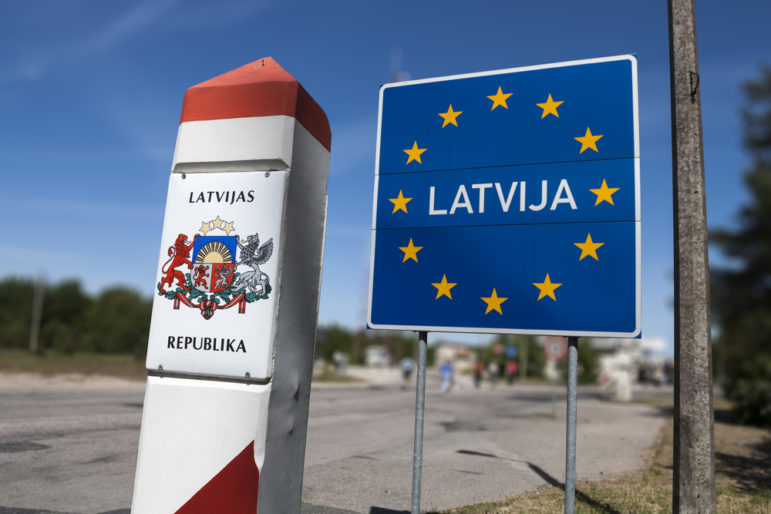

A woman holds a banner in support of independent journalists working in Belarus. Image: Shutterstock
How to Investigate When the State Conceals Data: Lessons from Belarus
Read this article in
In 2020, huge protests erupted in Belarus, drawing international coverage. The unrest emerged in response to allegations from poll workers that Alexander Lukashenko — who has been the president of Belarus for almost 30 years — had rigged the election.
While the protests were largely peaceful, Lukashenko brutally cracked down on dissenters, and hundreds of journalists, activists, and opposition politicians were arrested. The Belarusian Association of Journalists (BAJ) estimates that a further 400 reporters have been forced into exile since repression began.
“Most of [them] left the country, and European countries, the United States and Canada started to put sanctions on Belarus, and Belarusian goods and officials,” journalist Alina Yanchur told a session at Dataharvest, the European Investigative Journalism Conference. “After that, the Belarusian government came up with another idea — to conceal the data on foreign trade so they could avoid sanctions.”
Yanchur works at the Belarusian Investigative Center (BIC), an independent media outlet that primarily investigates corruption, sanctions avoidance, and Lukashenko’s finances. BIC has been labeled an “extremist organization” by authorities, so has been forced to operate from outside of the country. Belarus has one of the most oppressive media climates in the world, and has dropped 10 places in the RSF World Press Freedom Index since last year, ranking 167th out of 180 countries.
Access to government data has been thwarted since the crackdown. In 2020, during the pandemic, authorities started to conceal mortality data. Missing or vague official migration statistics since 2020 have also made it difficult to discover how many people have left the country. In 2023, restrictions tightened further when Belarus’s main statistical agency issued an order stating that it could officially withhold data for the sake of “national security.”
Despite the difficulties in accessing data, Belarusian journalists still find ways to investigate the actions of the state and its entities. Drawing on the example of one of BIC’s investigations, Yanchur shared advice on how to continue public interest reporting in the face of government repression.

Reporters Without Borders’s press freedom index ranks Belarus in the bottom 10% worldwide, with the country labeled as “one of the world’s biggest jailers of journalists.” Image: Screenshot, RSF
Tracking Sanctions Evasions
In 2023, BIC uncovered how, despite sanctions, Belarusian fertilizers — specifically urea — ended up in the hands of European buyers, and how Belarus’s largest state-run manufacturer had concealed the country of origin.
While foreign trade statistics are hidden in Belarus, in European countries they are accessible, and Yanchur often uses Eurostat, the statistical office of the European Union, to find trade information.
“Eurostat is a very reliable resource,” she said, “because you have very strict rules for European countries to record what they import, and in which amounts.” Yanchur also uses UN Comtrade, a global trade data platform that covers approximately 200 countries and represents more than 99% of the world’s merchandise trade, including territories outside of the EU.
As part of their investigation, BIC used Eurostat to compare the data for urea exports from Belarus and Uzbekistan to EU countries, before and after sanctions were put in place. Between 2017 and 2023, trade between the countries more than tripled, making Uzbekistan one of Belarus’s main trading partners.
Yanchur found a clear pattern: exports had reduced for Belarus and skyrocketed for Uzbekistan. “For five years, [Uzbekistan] were not selling urea at all,” she said. “And now suddenly, they had started to sell it.”
BIC then consulted other sources to confirm that straw companies in Uzbekistan had indeed been used to help the supplier bypass EU sanctions. “The statistics themselves show a trend and give you the clues, but there is always the possibility of other interpretations,” Yanchur said. “Maybe Uzbekistan built 10 factories in five years, and they just started selling urea in big numbers. You need to be critical about any data you see.”
She recommends studying trade news and press releases and talking to experts. One expert told the team at BIC that logistically, it was quite difficult and costly to send fertilizers by road or train from Uzbekistan to European countries, but much easier from Belarus. Another found faults in documents that were filed. “When we showed those documents to an expert, they were laughing,” she said. “It shows that they were never written by a person who deals with nitrogen fertilizers.”
Yanchur followed urea shipments between countries, uncovering which companies were trading with each other and who participated in trade agreements. They often used paid databases of global import-export records, she said, such as ImportGenius and Panjiva.
Elsewhere, they gleaned information from a variety of sources. “We have activists from the fertilizers industry, ex-policemen… we even have a group of priests,” she said. In many cases, activists are already following the footprints of the organizations bypassing sanctions.
Finding Company Connections
To establish which individuals were behind the network of companies assisting the supplier in circumventing sanctions, BIC worked cross-border with other journalists. “I recommend that every time you encounter a company from another country, contact journalists from that country,” Yanchur said, “because they might have more access and resources to get information than you can from open sources.” They also used company records, such as:
- Belarus’ paid official business register (only accessible in Belarus, or with a VPN)
- Legat.by, which publishes registration details and financial statements for companies in Belarus, Russia, Ukraine, Kazakhstan, Moldova, Kyrgyzstan, and Uzbekistan
- Orginfo.uz, which provides free information on companies in Uzbekistan
- YouControl, a resource on Ukrainian companies, most of which is free
- Spark-interfax.ru, which shows business records from Russia, Kazakhstan, and Belarus
- OpenCorporates, the largest open database of companies in the world, with over 200 million companies in 140 jurisdictions
- Dun & Bradstreet, which has reports on more than 500 million public and private companies
- Search.bisnode.rs, a business database of companies in Slovenia, Croatia, Serbia, and Bosnia and Herzegovina
- Unternehmensregister, a German company register
- North Data, which has data on a range of European companies, including German, Scandinavian, and Polish entities, and offers free accounts to journalists
Investigating People
When investigating people connected to companies, Yanchur recommended looking at other business records in an individual’s name — to find, for example, phone numbers linked to them — as well as using OCCRP’s Aleph and the platform OSINT.industries. Another source she often draws upon is Cyber Partisans, an anonymous hacktivist collective of IT specialists who “decided to use their technical expertise to confront the dictatorship.”

Cyber Partisans are an anonymous hacktivist collective of IT specialists. Image: Screenshot of their Facebook page
“At some point, they hacked some official databases of the Belarusian government,” Yanchur said. “If we need the information on a person and we can justify that it’s in the public interest, we can ask what [Cyber Partisans] have on them.” Information can include where an individual works, their contact numbers, passport data, and border crossings up until summer 2021.
To verify photos — when comparing a passport photo received from Cyber Partisans to another image of an individual, for example — Yanchur uses Amazon Rekognition. Reverse image search resources that she uses include the free-to-use sites Search4faces.com, FaceCheck.id, and TinEye, and the paid resource PimEyes.
 Emily O’Sullivan is an editorial assistant at GIJN. She has worked as an investigative researcher for BBC Panorama, and as an assistant producer for BBC Newsnight’s NHS Unit. She has an MA in Investigative Journalism from City, University of London.
Emily O’Sullivan is an editorial assistant at GIJN. She has worked as an investigative researcher for BBC Panorama, and as an assistant producer for BBC Newsnight’s NHS Unit. She has an MA in Investigative Journalism from City, University of London.











